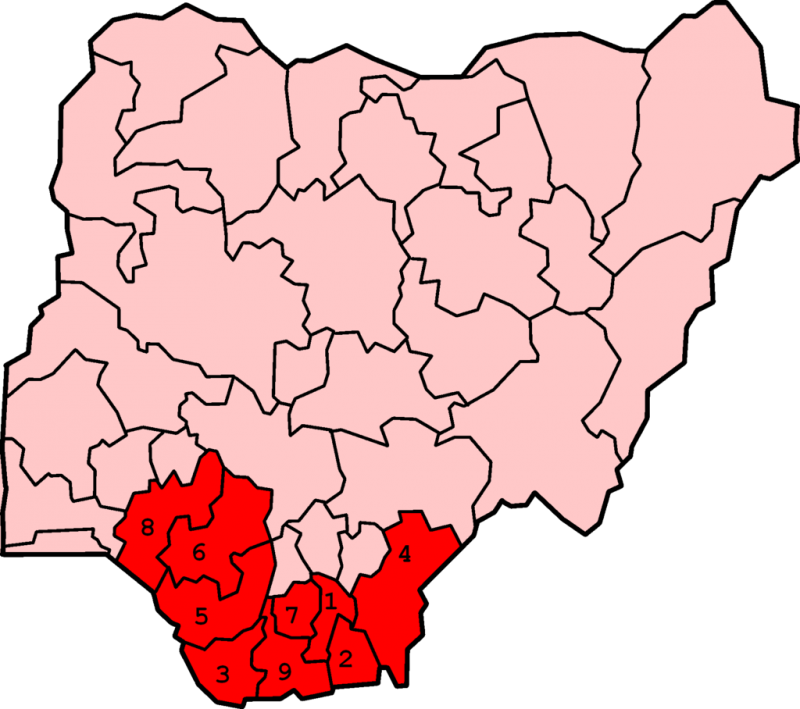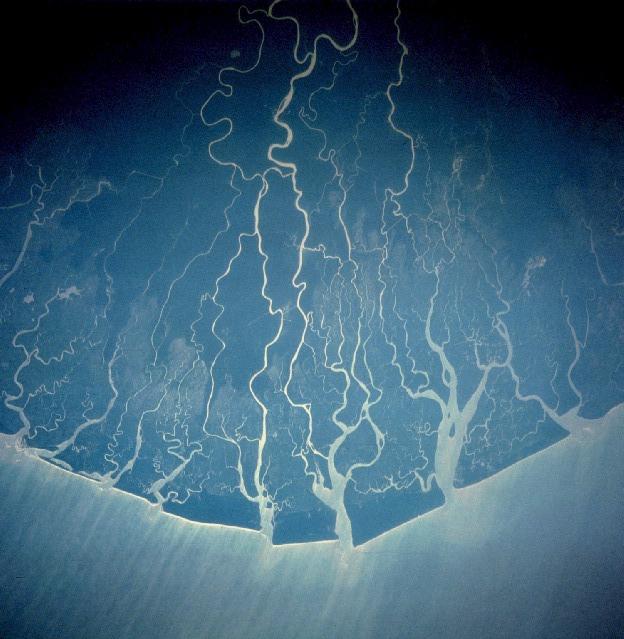
Map of Nigeria showing areas categorized as the Niger Delta
Map of Nigeria showing areas categorized as the Niger Delta
This image was created by Gozar. Click here to view Wikimedia source.
 This work is licensed under a Creative Commons Attribution-ShareAlike 3.0 Unported License.
This work is licensed under a Creative Commons Attribution-ShareAlike 3.0 Unported License.
Discourses on the Niger Delta’s environmental crises ought to incorporate the roles of the militants operating in the area. For a long time, the narratives of environmental degradation in the Niger Delta have been woven around the activities of oil corporations, to the neglect of the contributing roles of the numerous militants operating in the area. Indeed, multiple studies have emerged on the various ways the multinational oil companies have contributed to environmental problems in the Niger Delta, while there is a silence on the other major culprits—the Niger Delta militants—who have contributed immensely to the further degradation of the already degraded area.
The history of environmental degradation started long ago as a result of the activities of oil multinationals. The nature of the oil business, coupled with unconcerned attitudes to the environment on the part of the corporations and ineffective state control since the late 1950s, led to massive pollution and degradation of the lands, water, and air of the area. This was to have negative effects on the farming and fishing activities of local people, who are mostly agrarian by vocation. They became poorer since they were no longer able to engage in farming and fishing, as well as due to a lack of state support. The continued environmental degradation and growing immiseration of the majority of the people in the area led to the emergence of environmental activists, who are committed to raising local and international awareness of the problems caused by oil corporations.
What the activists did was to weave the narratives of general poverty and suffering around the activities of oil exploration. A picture was painted of how oil production destroys the environment (agricultural land and water) and sacred sanctuaries of the people, and how the Nigerian state was complicit in the matter. These narratives worked towards mobilizing the people against the state and the oil corporations. The motives of the first-generation environmental activists in the Niger Delta were altruistic and devoted to righting the wrong done by the multinational oil corporations. The first agitation, led by Isaac Adaka Boro, was expressed through marshaling violence and a declaration of secession from the larger Nigerian state in the early 1960s. This led to military action that quelled the uprising within 12 days. The second generation adopted an intellectual and pragmatic approach, as exemplified in the efforts of Ken Saro-Wiwa, a novelist, who took the struggle to the international arena. For their role in environmental activism, Saro-Wiwa and eight of his Ogoni compatriots were arrested on trumped-up charges and gruesomely executed by the General Sani Abacha military regime.

Satellite image of the Niger Delta
Satellite image of the Niger Delta
This photo has been produced by NASA. Click here to view Flickr source.
 This work is licensed under a Creative Commons Attribution 2.0 Generic License.
This work is licensed under a Creative Commons Attribution 2.0 Generic License.
However, the killing of the environmentalists did not stop the agitation. In fact, it led to the emergence of a plethora of activists and agitators, amongst whom are a motley of militants whose demands, motives, style, and operational tactics draw largely from Adaka Boro’s strategy of armed struggle. The style of the “militant activists” also moved sharply away from the intellectual approach of Ken Saro-Wiwa. It now involves the use of maximum violence as an instrument of protest. This includes large-scale and sustained vandalism of oil pipes and other property of the government and oil corporations; the bombing of oil platforms and supply routes; the breaking of pipes so as to cause oil spillage; the setting up of illegal refineries for bunkering; as well as the kidnapping of expatriate oil workers. Through bombings, oil pipe breakages, and vandalism, the militants release large volumes of oil and gas into the environment. These cause further degradation. Through the burning of buildings and offices belonging to the state and oil corporations, the land and air are further polluted. The illegal refineries being operated in the bush further destroy the mangrove forests in the area, which are rapidly dwindling. Kidnappings and unrestrained violence have prompted a large presence of troops and other security operatives. This militarization of the area also has significant environmental consequences. The military and militants are engaged in deadly encounters in the creeks and the mangrove forests, and several of the illegal shanty refineries have been destroyed by security operatives, with serious effects on the environment.
In their bid to right perceived wrongs done by the Nigerian state and oil corporations in the Niger Delta, militants have resorted to the massive destruction of pipelines, buildings, oil platforms, and major pipe routes so as to make their point. Though the tactics have brought them more money through negotiations and bargaining with the Nigerian government—i.e., proceeds from the ransoms of kidnap victims and illegal refineries they operate—the environment and, by implication, the people are the losers in the long run. In essence, militancy as conducted in the Niger Delta has contributed to the further degradation of the environment. It is a case of destroying to destroy. The Niger Delta militants are themselves destroying the environment, compounding the destruction caused by the oil multinationals operating in the area.
How to cite
Olaniyan, Azeez. “Destroying to Destroy: Militancy and Environmental Degradation in the Niger Delta.” Environment & Society Portal, Arcadia (Autumn 2017), no. 34. Rachel Carson Center for Environment and Society. doi.org/10.5282/rcc/8175.
ISSN 2199-3408
Environment & Society Portal, Arcadia
 This work is licensed under a Creative Commons Attribution 4.0 International License.
This work is licensed under a Creative Commons Attribution 4.0 International License.
2017 Azeez Olaniyan
This refers only to the text and does not include any image rights.
Please click on an image to view its individual rights status.
- Adunbi, Omolade. Oil Wealth and Insurgency in Nigeria. Bloomington: Indiana University Press, 2015.
- Agbu, Osita. “Oil and Environmental Conflicts.” In Nigeria under Democratic Rule, 1999–2003, edited by Hassan A. Saliu. Ibadan: Ibadan University Press, 2005.
- Afinotan, Lawrence and Victor Ojakorotu. “The Niger Delta Crisis: Challenges and Prospects.” African Journal of Political Science and International Affairs 3, no. 5 (2009):191–198.
- Ite, Aniefiok E., et al. “Petroleum Exploration and Production: Past and Present Environmental Issues in the Nigeria’s Niger Delta.” American Journal of Environmental Protection 1, no. 4 (2013): 78–90.








